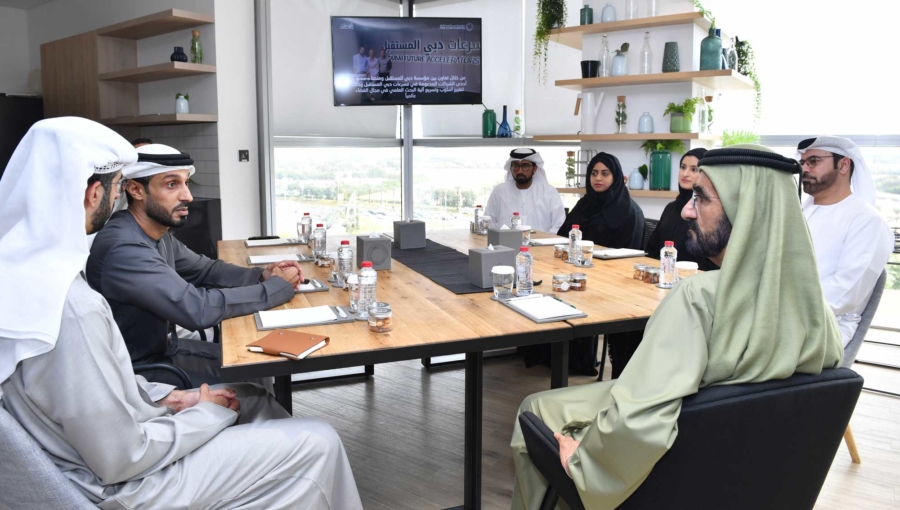His Highness Sheikh Mohammed bin Rashid Al Maktoum, Vice President and Prime Minister of the UAE, Ruler of Dubai, has launched the Mohammed bin Rashid Centre for Future Research.
The centre will openly publish its research and outcomes to global academic and research communities and will adopt a new concept based on open and participatory international research among scientists. Its first series of research initiatives will include the financing of a research community of 3,000 scientists, to conduct new studies on space science and technology.
“Our future plans require a solid foundation of scientific research, which comply with our aspirations. Our goal is to create the means of communication between our young scientists and scientists from around the world, to exchange knowledge, transfer experiences and build our national research capacities,” His Highness Sheikh Mohammed bin Rashid stated.
During the Centre’s launch, in the presence of H.E. Mohammad bin Abdullah Al Gergawi, Minister of Cabinet Affairs and The Future, H.E. Sarah bin Yousef Al Amiri, Minister of State for Advanced Sciences, and H.E. Omar bin Sultan Al Olama, Minister of State for Artificial Intelligence, His Highness Sheikh Mohammed said, “We are seeking to make the UAE an efficient and influential part of the international academic and research community.”
H.H. also highlighted the vital role of the UAE’s scientific community and added that the Dubai Future Foundation, the scientific community and the ministers of advanced sciences and artificial intelligence are part of the nation’s future scientific endeavours, and the country has faith in their abilities.
The Mohammed bin Rashid Centre for Future Research will present a new approach to scientific cooperation, by adopting participatory research studies among international scientists, and motivating and attracting scientists to perform leading and innovative studies and research in over 50 areas. It also aims to develop a system of communication between international scientific communities, to exchange expertise and benefit from the outcomes of their studies and experiments.
The Centre aims to support the UAE’s scientific research sector in a variety of areas, as well to raise the country’s position in scientific performance indicators. It also aims to support the efforts to link Emirati research projects to international academic institutions, as part of the UAE’s goal to become an incubator for scientific inventions, which will serve the strategy of the UAE Centennial 2071, based on prioritising space sciences and the advanced science sector.
The Mohammed bin Rashid Centre for Future Research has taken on a range of challenges that include specialised research on space science, by involving scientists and researchers from a variety of scientific and academic institutions in the UAE and around the world, to nominate their research projects on space science, space colonisation and the exploration of various aspects of human life. Those interested in participating can apply through the centre’s website.
The Centre will assess the nomination requests and proposed projects through a specialist scientific committee and will provide the necessary support for the chosen projects.
The launch of the Mohammed bin Rashid Centre for Future Research marks the culmination of a long journey, where the UAE has made strides in developing its aerospace and science industries. The nation is on track to realise its vision and become a regional pioneer in the sciences, as well as an integral part of the larger global scientific community. This, in turn, resonates with the UAE Centennial 2071 plan, which seeks to cement the UAE’s distinguished status in scientific, economic, cultural and social sectors by the country’s 100th anniversary.
H.H. Sheikh Mohammed bin Rashid Al Maktoum has also recently launched the UAE Astronaut Programme, part of the Mohammed Bin Rashid Space Centre. The Programme seeks to recruit and train four Emirati astronauts to send to the International Space Station (ISS), where they can exchange scientific knowledge and expertise with their international counterparts and conduct scientific experiments in outer space for the benefit of mankind.
In recent years, the UAE has made remarkable strides in its space programme, developing satellites and building a probe to be sent to Mars under the Emirates Mars Mission, which has been named “Hope”. The Probe will be built entirely by UAE scientists and engineers. It will be launched to Mars in 2021, as the Emirates celebrates its 50th anniversary.
The UAE had formally adopted the UAE Centennial 2071 plan, announced by H.H. Sheikh Mohammed bin Rashid Al Maktoum, Vice President and Prime Minister of the UAE, Ruler of Dubai; and H.H. Sheikh Mohamed bin Zayed Al Nahyan, Crown Prince of Abu Dhabi and Deputy Supreme Commander of the UAE Armed Forces. The plan includes a set of scientific aspirations for the country in the coming decades – including the Mars 2117 Project, which seeks to contribute to human colonisation of the Red Planet in 100 years’ time.
Complementing this ambitious strategy, the Mars Scientific City was established in the UAE – the first and largest “space city” of its kind in the world and a viable prototype for a settlement on Mars. The City was launched in September, on the sidelines of the UAE Government Annual Meeting. Set to be built in Dubai’s Mushrif Park, the site will include food, energy and water laboratories, as well as an international museum showcasing the country’s most important achievements in space science and futuristic agriculture to meet the country’s future food security needs.
